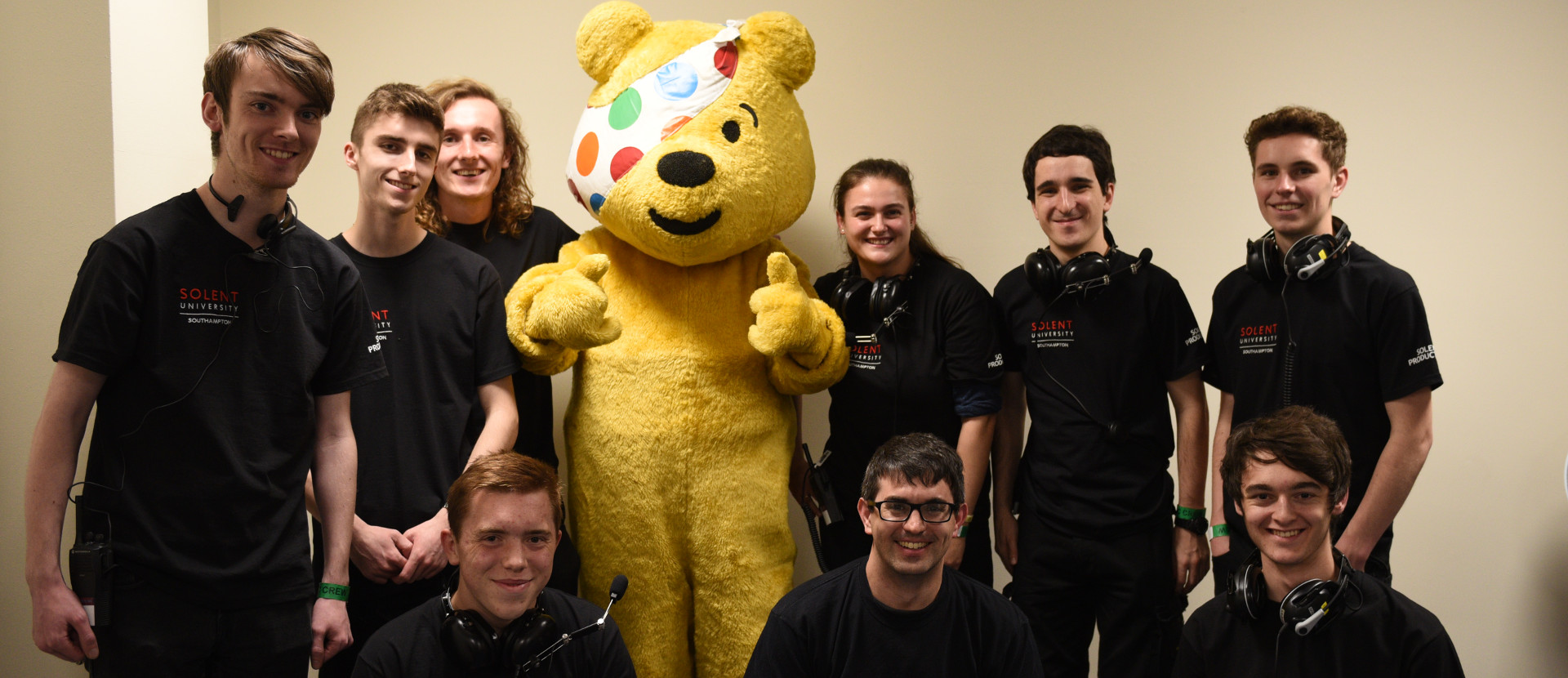
BBC Children in Need 2018
Staff and students from the Media Technology programme were pleased to assist BBC South once more for their regional contributions to BBC Children in Need.
Staff and students from the Media Technology programme were pleased to assist BBC South once more for their regional contributions to BBC Children in Need. Each year the BBC use our Outside Broadcast truck for the event and a student crew help with the rig, transmission and derig. This year was particularly convenient for us as it was broadcast from King Edward VI School, which is just over a mile from the University campus.
In total seven regions were involved this year based in St Ives, Cardiff, Southampton, Lincoln, Glasgow, Wolverhampton and Belfast. Each region assembled a temporary studio to accommodate guest fundraisers and the Children in Need Choir; our pieces were contributed live to the southern region during the lunchtime news, South Today and twice during the main program. The highlight is then a live contribution to the national program where each of the regional choirs are synchronised and combined for a ‘bounce’ around the country. The bounce around is challenging from a technical and production perspective as the feeds from the seven choirs experience different delays reaching the BBC’s Elstree Studio but must all be synchronised so that the sound and vision can be combined.
The first student crew arrived with the OB truck on the Thursday and helped run the cabling to provide power, sound, vision, lighting and communications links between the studio and production vehicles. The initial challenge was physically getting all of the equipment into the school’s first floor theatre and finding safe routes to run the cabling. The get-in provides an excellent opportunity for the students to speak with the BBC engineers and contract staff about the systems and engineering principles before the pressure of live-production kicks in. It’s good for the students to understand the planning that goes into a high profile OB and discuss the systems and workflows in use.
The core crew returned for rehearsals and transmission on Friday and were joined by some relief crew. The course team were particularly pleased that additional members of the original crew were asked to come back by the BBC on the strength of their contributions during the get-in – we take that as quite a commendation. Friday started off with the calibration and testing of the various systems including aligning the cameras and testing the latency from our site to Elstree. After some technical and production rehearsals we were ready to produce a few pre-recorded segments as well as the live contributions. It was a busy day with plenty of people in the studio such as local fundraising groups and 205 children from five local schools for the choir. The students were able to assist some of the BBC engineers during transmission and observe the operation of the production gallery – it’s inspiring to witness how the crew work together and rely on constant communication to bring all of the elements together. We were very fortunate this year to receive an impromptu workshop on operating the jib from the BBC operators and the course team were relieved that the set even remained intact afterwards!
There were plenty of technical gripes during the event and the students got to observe and help with fault-finding and mitigation, which is extremely valuable. The staff were also put through their paces as the BBC wanted to route an analogue composite PAL signal though the camera fibres to feed their autocue; whilst technically possible this wasn’t something that the team have done before so they got to explore some new menus on the camera heads and camera control units! The BBC South contribution looked great as usual and we’re always pleased to be able to uplink in HD thanks to the use of Solent University’s OB truck. The derig went smoothly and the students were able to appreciate the value of ‘rigging for the derig’ as well as practicing some basic cable management.
The course team would like to extend our thanks to BBC South for getting us involved again as well as to all the production staff and crew for taking the time to get the students involved and for sharing their knowledge and passion. Thanks also to King Edward VI school for their hospitality and catering.




